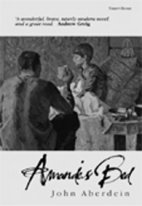by John Aberdein, (Thirsty Books, £9.99), Reviewed by Mary McGregor

For me, reviewing a novel rather than writing a conventionally political article for Emancipation and Liberation was always going to be a pleasure. Even more so when it is written by Scottish Socialist Party comrade, John Aberdein.
I am a great believer in the power of the novel, not only to politicise and raise awareness, but also as a means of relating theory to practice in fictional situations. People like me who are drawn to fiction find there, not the escapism of the bourgeoisie, but the very essence of the politics as it affects humanity. We see the human condition and can marvel at its bravery, laugh with its humour and grow angry at the horror of its existence under capitalism.
Armande’s Bed is that kind of novel. In the tradition of Grassic Gibbon and Mackay Brown, we are drawn into the world of characters who are painfully familiar and who reveal the necessity for Marxist solutions by describing a reality we know to be true. The class system of Scotland in 1956 is not described but lived on a daily basis, She’d never speak to dirt from the tenementsm
.
Peem, the main protagonist, brings innocence to all the events which provide great humour and insight. As Peem has education thrust upon him, it reveals the absurdity of an education system which was determined to bring about a cultural cleansing by denying the validity of anything relating to working class experience.
It is with Peem that we experience the warmth and love (completely un-sentimentalised) in many working class homes. We contrast his life with Spermy whose mother Armande is the sleepyround woman
. As the widowed incomer, she struggles to look after her family and is eventually subjected to brutal electrotherapy in a mental hospital.
And, as Peem helps his father sell the Daily Worker, the betrayal of the international working class by Stalinism becomes most evident, …its nae me chuckin the Party, the Party chuckin me mair like, that’s what it comes doon till. It’s enough to gar a body greet
.
It is the language of Armande’s Bed which helps to establish its authenticity. It is beautifully honed and yet Aberdein uses it as a weapon to reveal hypocrisy, injustice and defiance. The laughter we experience in reading this book is only surpassed by the constant feeling of impending disaster which is in itself the nature of life under capitalism. The hope lies in the ability of working class people to survive, unite and become conscious of their destiny. This is the type of book which shows that political education can come in a literary format and one that speaks our language in more ways than one.
